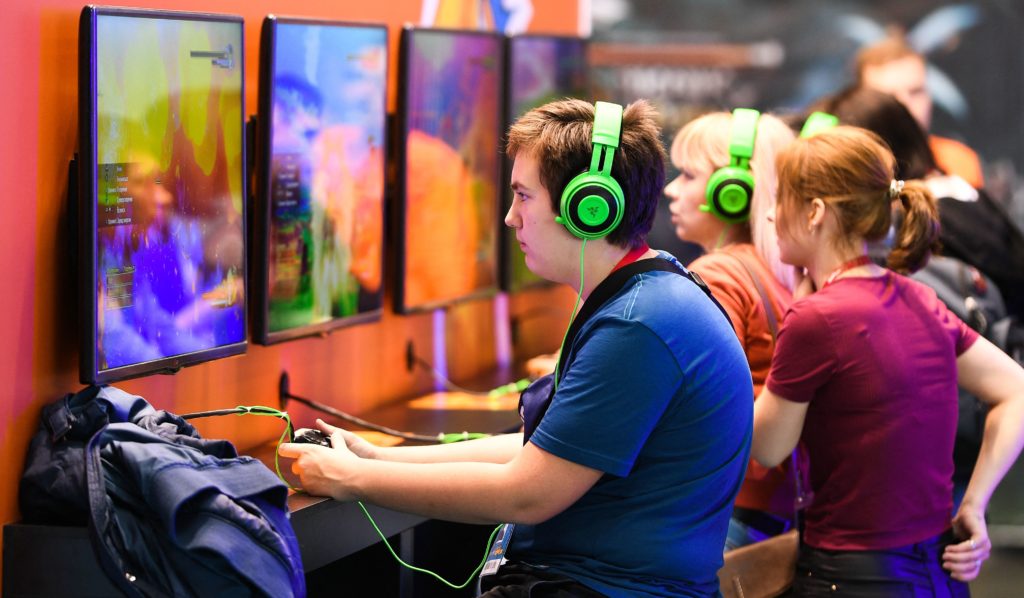São Paulo – Brazil has established itself as a major developer and exporter of video games for mobile devices, computers, and consoles. Last year alone, the country exported over USD 53 million in games. The primary destinations were the US, Canada, and Europe. However, the sector is aiming on Asian countries like China, India, and even Arab countries like Egypt and the UAE.
According to the vice president of the Brazilian Association of Digital Game Developers (Abragames), Carolina Caravana, many game development hubs are being established in Brazil, in the states of Santa Catarina and Rio Grande do Sul, in the Federal District, and the North Region. “In the Federal District and the North, we see the greatest growth of new companies in the last two years, and many are being born and already bought by larger companies, both Brazilian and foreign,” said Caravana to ANBA.

O maior volume de jogos lançados é de jogos para celular, os chamados “hiper casuais”, que geralmente são mais rapidamente desenvolvidos e mais fáceis de serem colocados no mercado. Eles, no entanto, não prendem tanto o jogador como outros formatos. Caravana afirma que os games para celular são os que mais são exportados em termos de volume, mas não necessariamente os que trazem mais receita. “Há vários modelos de empresa e de desenvolvimento de jogos, e todas vendem bastante, é difícil precisar qual vende mais”, disse.
The most significant volume of games launched is for mobile devices, the so-called “hyper-casual” games, which are generally more quickly developed and more accessible to be placed on the market. However, they do not hold the player as much as other formats. Caravan says that mobile games are the most exported in volume, but not necessarily those that generate the most revenue. “There are many company and game development models, and they all sell plenty; it is difficult to specify which one sells the most,” she stated.
“It is important to note that there is a Brazilian unicorn company in the mobile area called Wildlife, which is valued at USD 1.3 billion,” said Caravana, who is also a partner and producer at the game company Aiyra. Unicorn companies are startups that have a market valuation of over USD 1 billion.
Call of Duty, a worldwide known game, had its design developed by a Brazilian company, Kokku. Some of the best-known Brazilian games in the world, according to Caravana, are Horizon Chase, Dandara, Pixel Ripped, Starlit Adventures, and Wonderbox. She also mentioned the Brazilian game Gravitational, in which the protagonist is a person with a disability in a futuristic wheelchair.

“An interesting fact, in Brazil, over 51% of the people who play video games are women, the majority of players. In addition, we found that 40% of the players are black, almost half, and it is very relevant that companies take this into account when creating the games,” said the businesswoman, adding that it is a tendency to think about different audiences, to tell different stories, reflecting about the player and entertainment responsibly. “Diversity can be not only an important thing, but it can also be fun, cool, curious,” she pondered.
The gaming market has grown worldwide since the outbreak of the COVID-19 pandemic. Caravana says Google has reported the number of published games has doubled internationally. “Companies that already had games ready to be launched saw a huge increase in this kind of consumption. There was also an increase in the educational market. Some companies closed or left the country, but in general, there was a boom in the ecosystem, and the sector did grow,” she stated.
Main markets
The main destinations for Brazilian games are the US, Canada, and according to Caravana, some companies manage to perform well in Asian countries like China and India, which have great potential. Arab countries like Egypt and the UAE are also promising markets, with several events aimed at the sector, says Caravana.

“For countries that have a significant cultural difference, it is often difficult to localize games for these markets, and because of that, companies usually have consultancy services to obtain information,” said Caravana. Localization is the adaptation of the game to both the language and the laws and customs of a new market.
She states that the localization process in Brazil is known to be careful with the adaptations to each country, not only with the language but also to the age rating, target audience, among other aspects.
“The more mature companies already take this into account, and for the export project, we try to bring that readiness to the younger companies,” she said, mentioning the sector improvement project that Abragames has with the Brazilian Trade and Investment Promotion Agency (Apex-Brasil) since 2016 and which was renewed until 2023.
She says that each year the project is changing, increasing the actions that work and leaving aside those that did not work. The project takes Brazilian games and companies to international events and brings foreign buyers to Brazil through events, activities, and business rounds.
As for the Arabs, the vice president stated that they are very connected to innovation and extended reality. “This growth is solid, we have had several contacts, and several events are held in Egypt and Dubai (UAE). Egypt is trying to grow, and Dubai has many Brazilians giving consultancy services related to games and gamification for education and museums. The extended reality is a subject of attention in this market,” she said.
Abragames
The association has new management that took over in March. “We are looking for a dialogue with all sectors wanting to make games, we are welcoming, and we want to increase this dialogue and be seen as a sector that for those who do not know may seem small but is growing a lot and already has very mature companies performing all kinds of work,” concluded Caravana.
To contact Abragames, send an email to [email protected] or visit the association’s website.
Translated by Elúsio Brasileiro
The opening picture is merely illustrative.




